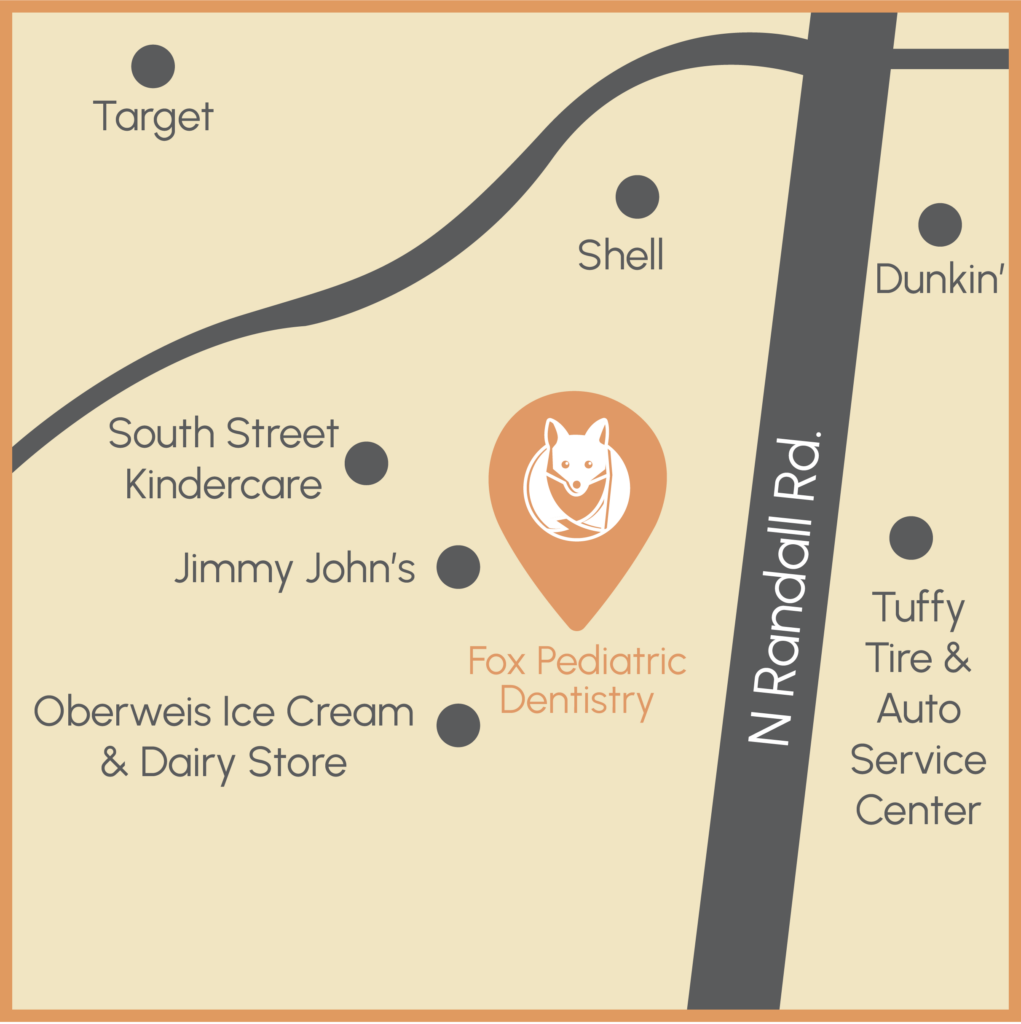Services
Emergency Dentistry

Emergency Dentist for Kids in Elgin, IL

Dental Emergency?
Below are tips and additional information on managing common pediatric dental emergencies:
Infections
A dental infection can require urgent dental care. The most telling signs of a dental infection include facial swelling and fever:
Facial Swelling
Swelling of the face may occur because of a tooth infection from a cavity.
- If your child exhibits severe swelling of the face with difficulty breathing, take your child to the emergency room immediately.
- If your child exhibits mild swelling, please call our office for an appointment or to reach our after-hours line.
Fever
A fever may occur as a result of an infection from tooth decay.
- If your child develops a high fever (>104 degrees F) or presents with other symptoms (fussy, lethargic, unable to eat/drink), take your child to the emergency room immediately.
- If your child develops a low-grade fever (100-104 degrees F), please call our office for an appointment or to reach our after-hours line.
- Note: If your child is under one month old, a fever over 100 degrees F is an urgent trip to the emergency room.
Abscess
An abscess or gum boil indicates an infection, and it is often preceded by extreme tooth pain. While not necessarily a dental emergency, treatment is in order. Please call us to schedule an appointment.
Tooth Pain
If your child is experiencing tooth pain, identify the region of pain and check for large holes or dark areas on your child’s teeth. In the meantime, Tylenol or Motrin may be given for temporary pain relief.
Look for signs of food impaction in large cavities, and avoid eating sticky sweets or carbohydrates. Food impaction may exacerbate the pain. Relieve food impaction with gentle flossing and rinsing with warm water.
Please give us a call, as a sizeable untreated cavity can quickly become lead to infection.
Burned Roof of Mouth
A burn on the roof of your child’s mouth or palate is often from eating hot-temperature foods like pizza. These injuries often go away on their own in 7-10 days. A cold compress and warm salt-water rinses can help speed up the healing time.
Bleeding Gums
Bleeding gums are often a result of gum disease with varying levels of severity. If your child’s bleeding gums are painful, a more significant underlying issue often must be addressed. Please call for an appointment to have your child evaluated.
Mouth Sores
A painful, irritating sore inside the mouth is most commonly a canker sore. A canker sore comes and goes and usually does not need treatment. If the sores become debilitating, please call our office.
A painful, irritating sore around the outer lip area with either a blistered or crusted-over appearance is most commonly a cold sore. Cold sores can be highly contagious by direct contact. During this time, avoiding sharing drinks, towels, and kissing is essential.
Trauma
If your child has sustained a significant head, face, or jaw injury, please take them to the emergency room.
If your child has a tooth injury, call (224) 629-4125.
Tooth Avulsion or Fracture
The most severe tooth injury is when a tooth is lost or fractured.
If unsure, adult teeth can be present as early as six years old. If your child has lost a tooth, please follow the directions below:
- Pick up and touch the tooth only by the top part of the tooth (crown).
- If the tooth is dirty, gently rinse it in milk or the patient’s saliva (not water).
- If possible, attempt to re-plant the tooth immediately in the correct orientation and bite down on gauze until you see the dentist.
- If re-plantation is impossible, immediately put the tooth in milk or a cup with the patient’s saliva. Bring the tooth with you to the dentist.
All other severe adult tooth fractures or displacements require emergency dental care.
A lost baby tooth is often less critical as the tooth may have already been on its way out. A small tooth chip is unlikely an emergency, but having your child evaluated by our office is still essential.
Bitten Lip, Cheek, or Tongue
A small accidental bite to the lip, cheek, or tongue is unlikely to require a trip to the emergency dental clinic but should be evaluated if there is a large cut with persistent bleeding.
It is vital to beware of your child after a dental appointment with local anesthesia. Persistent biting and rubbing of the cheek or lip commonly cause a traumatic ulcer.
A cold compress and warm salt-water rinses can help speed up the healing time.
Lost Restorations
Did your child’s crown or space maintainer fall out? If possible, please bring the lost restoration to your appointment, and we will attempt to re-cement them back onto the tooth.
If your child’s dental filling falls out, your child will likely need a new filling.
To avoid losing restorations in the future, avoid very sticky and hard foods such as toffee, hard candy, or chewy candy.
Food or Object Stuck in Teeth
If something is stuck in your child’s teeth, it will most likely be stuck between two teeth. Use a flosser, interproximal brush, or a piece of floss to dislodge and remove it gently.
Swallowed Foreign Object
If your child has swallowed a foreign object with any abnormal symptoms (e.g., coughing, pain upon swallowing, discomfort), there is a chance that the object has been aspirated (went down the wrong tube). Please take your child to the emergency room immediately.



